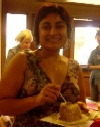

A warm welcome to our diverse group of visitors this year! More about their research and
interests:
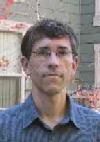
Stephen Wechsler
Stephen Wechsler is Associate Professor of Linguistics
at the
University of Texas at Austin. He is
spending this fall at Stanford while on leave from UT. His work centers on syntax, morphosyntax, and
lexical semantics. He has worked on a variety of languages, including Korean, Balinese, Serbian/Croatian,
ASL, Swedish, Finnish, and English. Stephen is currently writing a book on the syntax-lexical semantics
interface, to be published by Oxford University Press. Earlier this month, Stephen was the keynote speaker at the Texas
Linguistics Society 9 Conference; his address was "The Austronesian WH Disagreement."

Judi Preston
Judi Preston is a visiting scholar from Nagoya University, where she did her graduate work in language
processing and second language acquisition of adult learners of Japanese. For her PhD dissertation, she
developed a profiling procedure to evaluate the learner's stage of acquisition of Japanese grammar based
on real-time, spontaneous speech interviews. Her specific research at Stanford involves applying the
descriptive framework of LFG to her corpus of Japanese L2 data.
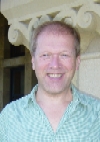
Helge Lødrup
Helge Lødrup is Professor of Linguistics from Oslo, Norway: http://folk.uio.no/helgelo/ He reallys enjoy
visiting Stanford; it is his second time! His sponsor is Joan Bresnan, and he is working on the syntax of
an exotic language often referred to as 'Norwegian', within the framework of LFG. His current projects
concern aspects of binding theory, and raising to object with believe-type verbs. An important premise of
both projects is the realization that the grammatical options of Norwegian are traditionally underreported.
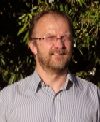
Tibor Laczko
Tibor Laczko is an Associate Professor from the Department of English Linguistics, University of Debrecen,
Hungary. He's here on a Fulbright research grant for this academic year. He investigates morphosyntactic
phenomena in Hungarian noun phrases (possessive constructions, nominalization, participle formation etc.)
in comparison with English in an LFG framework. Tibor is working on a book while here and just joined the
ParGram project.
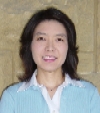
Mika Shindo
In Japan,
Mika Shindo worked for the National Institute of Communications and Technology (Kyoto); her research
explores the mechanisms of semantic extensions and their syntactic constructions. Her Ph.D. (Kyoto U.)
panchronically analyzes divergent extensions of meanings and constructions of English sensory adjective pairs having the same origin, such as
bright vs. clear, flat vs. plain, keen vs. eager. Mika's dissertation also included a collaborative project with NLP researchers in NICT analyzing
whether adjectives in a given sensory modality connect with the same modality of cognition.
Elena Maslova received her Ph.D. from Institute of Linguistics in St. Petersburg (Russia) and Habilitation
(post-doctoral qualification in general linguistics and typology) from Bielefeld University (Germany), with
which she is still affiliated. She spent quite a number of years studying the Yukaghir languages (spoken in
the Saha republic of Russia), and published two grammars of these languages and a collection of texts. At
the present time, Elena's primary research interests cluster around methodological (in particular,
mathematical) aspects of linguistic typology. Among other things, she is interested in looking for
meaningful links between statistical cross-linguistic studies and Stochastic OT models (as well as other
probabilistically oriented versions of OT).

Several linguistics undergraduates participated in department-sponsored internships this summer, working
closely with faculty on research projects ranging from phonetics to sociolinguistics. On Friday, November
4th, they presented their findings at a department-wide colloquium:

Tracy Conner
"Language and Social Identity"
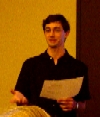
Tommy Grano
"English pronoun case in coordination"
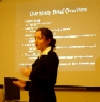
Lisa Tittle
"Clarity in communication"

Rowyn McDonald (with Tracy Conner) "Changing ALL"

More in the summer lives of linguists ...
(See the
bottom of the page for answers.)
(1) I got my solar power equipment eaten up by roaches (this after having my first laptop
eaten by roaches). I managed to rig the thing to work again, though, in the process learning
among other things that there's a difference between AC and DC current. Damn near fried my second
laptop trying to McGuyver my way to some power for my laptop. I also went pineapple hunting in the
bush with perhaps the youngest fluent speaker of Ulwa in town, who's about 12ish. Oh yeah, another
thing. With that same kid and one of my consultants, I went fishing, and damn near got my hand
amputated by a monstrous tarpon fish that caught my line (you have to hold the line in your hand,
and when the fish is big and strong, and this one was, the line digs into your hand, burning your
hand). Fish got away, but I still have my hand. I
ate this, and some rodent that basically looks like a groundhog, but who's name escapes me at the moment.
Also shrimp for a while until I was totally sick of it. And powdered milk. Comi tambien endangered
green sea turtle (the staple meat of the Ulwa and Miskitu people).
(2) This summer I took my first trip to Africa, for a mixture of fieldwork and fun.
I spent 9 weeks in the Akan-speaking regions of Ghana (in the south-central regions), collecting
both primary data and secondary sources on some phonological processes in Akan, namely
syllable-initial consonant palatalization (its regional distribution and dialect differences, its
morphophonological constraints, and other questions of variable production). I had about two
dozen consultants from different regions and towns, some very good friends and others complete
strangers who I just met on the street. I also had a good time at the University of Ghana's
excellent linguistics library, and enjoyed conversations and delectable meals with a few very
helpful Akan linguists. And I spent a good deal of time trying to practice my conversational Twi,
but improvement in that area will have to wait for another future visit!
(3) I *really* didn't do anything interesting. Well, other than the last few days of
the summer, when I translated and made new subtitles for a John Woo movie. Does that count? No,
no, it wasn't like a professional thing, it was just me, at home, getting annoyed that the movie
didn't have good English subtitles. So I made new ones.
(4) I drank Belgian beer, gave a talk, didn't give another (though I wanted to, really, I
wanted to), gave one more, tried to teach people in the High land, left the country, was charmed by
the limitlessness of Berlin, raced to Venice to capture its beauty and lie at the beach, wondered
what THAT was all about but got distracted by the Alps, which I approached from France and left
headed North. I didn't eat horse meat, but I thought about it. Instead I learned that singers don't
like air conditioning and that Maryland is close to Washington and yet so far away and almost as
humid as Boston. I almost gave up, wanted to leave it all behind, but then there was help, encouragments,
and several wine-induced stimulating conversations about the way we process at multiple European
cities, a sparkling day in Cassis followed by the a 1994 Bordeaux and McCluskey (Angela, that is),
and, I guess, my own very very own curiosity. Six countries and many hours at cheap airports later,
I came a lot closer to (temporary) peace. Amen.
(5) My wife and I took our 6-wk old baby on a trip across the USA, from Durham, NC, to Stanford, CA,
going through Kansas City, MO. As a result, he now definitely loves planes and airports. I left for two
weeks to go to the LFG05 conference in Bergen, Norway, and the Xth International Congress for the Study of
Child Language in Berlin, Germany. I presented work on Spanish Clitic Doubling in OT, the role of gesture
in getting and maintaining children's attention in interactions (with Eve Clark), and the acquisition of
English Yes-No Question with special emphasis on reduced and uninverted forms. Everything went rather well,
I must say, but I missed my family a lot. Between conferences I went to Paris for four days to visit old
friends. Then we went to Santa Fe, NM for 5 days, and then to KC, MO for a weekend for a wedding, both
trips "sponsored" by my in-laws! We played tennis like crazy and got beat by my in-laws 40 years' experience
in doubles... shameful, given that my mother-in-law has had both her knees replaced! Then the rest of the
time we worked. Cheers!
(6) I spent most of the summer sitting on my (posterior).

Salutations to Penny Eckert, whose accomplishments were recognized last week by the University of Copenhagen
with an honorary doctorate (officially, Doctor Philosophiae Honoris Causa). Congratulations to Penny for this well deserved honor!
We look forward to her photos and tales of wining and dining in Denmark.
This has been a busy November for David Beaver. The beginning of the month saw him honored with the
Gordon and Dailey Pattee Faculty Fellowship, which recognizes outstanding faculty in the humanities and social sciences.
Congratulations, David! He then took his show on the Japanese road, addressing "The Semantics and Pragmatics of Focus Sensitivity"
at the National Institute of Informatics
Workshop on Focus in Tokyo and
the English Linguistic Society of Japan in Fukuyoka.
Tom Wasow has been making the most of his autumn quarter leave. He was the inaugural
speaker in the Distinguished Lecture Series at the University of Washington's new Turing Center on November 4th
(the title of his talk: "Selecting Among Paraphrases"). The
Turing Center
is dedicated to "Investigating problems at the crossroads of natural language processing, machine learning,
Web search, and the Semantic Web."
Emily Bender is
among its affiliated faculty, and is one of three people on its advisory board.
As part of the Stanford Humanities Center's
25th anniversary conference,
Geoff Nunberg organized a panel on "Knowledge in Language" on Oct 15. Tom was one of the members of the
panel; his presentation was called "Knowledge of Language".
John Rickford delivered the keynote speech at the Mary Lou Fulton Endowed Symposium, at Arizona State's
University Club in November. John's speech, "African American Vernacular English (aka Ebonics) and the Black/White Achievement Gap in Schools,"
can be found
here (mp3).
Elizabeth Traugott recently published a book with Laurel J. Brinton (find it in the department library):
"Lexicalization and Language
Change" (Research Surveys in Linguistics). Cambridge: Cambridge University Press, 2005.
Elizabeth also recently published the following articles:
"Lexicalization and grammaticalization", in A. Cruse, F. Hundsnurscher, M. Job, P. R. Lutzeier, eds.,
Lexikologie/-Lexicology. Berlin: Walter de Gruyter, Vol. 2: 1702-1712 (2005).
(Ka'ala Yezbick and Elizabeth Closs Traugott) "Recent developments in viewpoint -wise". American Speech 80: 105-112 (2005).

We're looking forward to your tasty treats and holiday cheer at our annual department holiday party! Next Friday,
December 9th, at 3pm in the MJH lobby.
Albuquerque ... the place to be during the first weekend of 2006. Almost 30 Stanford linguists
will present at the
2006 LSA meeting,
including Elizabeth Traugott (discussant, panel on "Speaker-based motivations for language change")
and Ivan Sag (ellipsis symposium: "What's LF got to do with it?"). More notes from the field in January.
SSILA's annual meeting will be held concurrently
with the LSA, where you'll find Andrew Koontz-Garboden ("Two classes of intransitive verbs in Ulwa"),
Elisabeth Norcliffe ("Agent focus in Jakaltek"), and Judith Tonhauser ("Paraguayan Guaraní as a tenseless language").
Speaking of Judith ... she's off on another Paraguay adventure. She writes: "From 11/24 to 12/24, I'll
return to the small community "San Isidro" in the south-east of Paraguay where I already lived during the
summer (which is winter in Paraguay) -- this time, it's going to be summer there and I'm looking forward to
eating lots of pineapples. Of course, I expect to learn lots more about subsistence farming, chicken
breeding and cow herding, so if you have any pressing questions concerning these topics, let me know. And,
yes, I'll also be doing fieldwork on Guaraní, which is the first language for everybody in the village --
they even have a radio station which broadcasts in Guaraní! I'll be working on the nominal and verbal temporal
system of the language. Hope you all have a good break, and I'll see you in 2006!"
[Editors' note: We'll miss you, Judith, jepiguáicha.]
Elizabeth Traugott is the invited speaker for three upcoming talks in Copenhagen and Berlin:
"They're all crazy about the simple life": Historical aspects of adverbial ALL. Current Topics in Typology,
celebration for Ekkehard König, Berlin (Jan. 13th-14th, 2006).
"Constructions and grammaticalization revisited". Invited talk, Copenhagen (Jan. 16th, 2006).
"Object topicalization in Old English". Invited talk, Copenhagen (Jan 17th, 2006).
Peter Sells will be in Berlin in mid-December, where he'll talk about
"OT Moderations of MP derivations" at the
Descriptive & Explanatory Adequacy in Linguistics workshop.

Nikhila ushers in another year ...
It's not a birthday week without cake ...

(1) Andrew Koontz-Garboden, (2) Lauren Hall-Lew, (3) Rebecca Starr, (4) Florian Jaeger, (5) Bruno Estigarribia, (6) John Beavers













